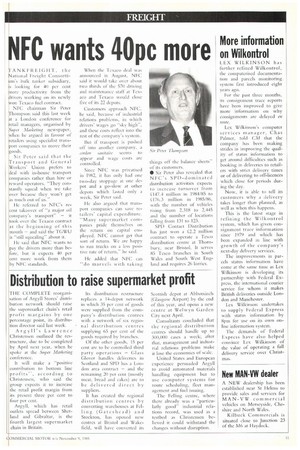Distribution to raise supermarket profit
Page 13

If you've noticed an error in this article please click here to report it so we can fix it.
FHE COMPLETE reorganisation of Argyll Stores' distribution network should raise the supermarket chain's retail profit margains by one percentage point, its distribution director said last week.
Argyll's Lawrence Christensen outlined the restructure, due to be completed by April next year, when he spoke at the Super Marketing conference.
It will make a "positive contribution to bottom line profits, according to Christensen, who said the group expects it to increase the retail profit margin from Is present three per cent to 'our per cent.
Argyll, which has retail outlets spread between Shetland and Gibraltar, is the fourth largest supermarket chain in Britain.
Its distribution restructure replaces a 14-depot network in which 35 per cent of goods were supplied front the company's distribution centres with a network of six regional distribution centres supplying 65 per cent of the goods required by branches.
Of the other goods, 15 per cent are to be controlled third party operations — Glass Glover handles deliveries in Scotland and SPD has a London area contract — and the remaining 20 per cent (mostly meat, bread and cakes) are to he delivered direct by suppliers.
It has created the regional distribution centres by converting warehouses at Felling (Gateshead) and Stockton, has opened new centres at Bristol and Wakefield, will have converted its Scottish depot at Abbotsinch (Glasgow Airport) by the end of this year, and opens a new centre at Welwyn Garden City next April.
Consultants concluded that the regional distribution centres should handle up to 300,000 cases a week; after that, management and industrial relations problems make it lose the economies of scale.
United States and European experience persuaded Argyll to avoid automated materials handling equipment but to use computer systems for route scheduling, fleet management and fuel issuing.
The Felling centre, where there already was a "particularly good" industrial relations record, was used as a testbed as Christensen believed it could withstand the changes without disruption.












































































































































